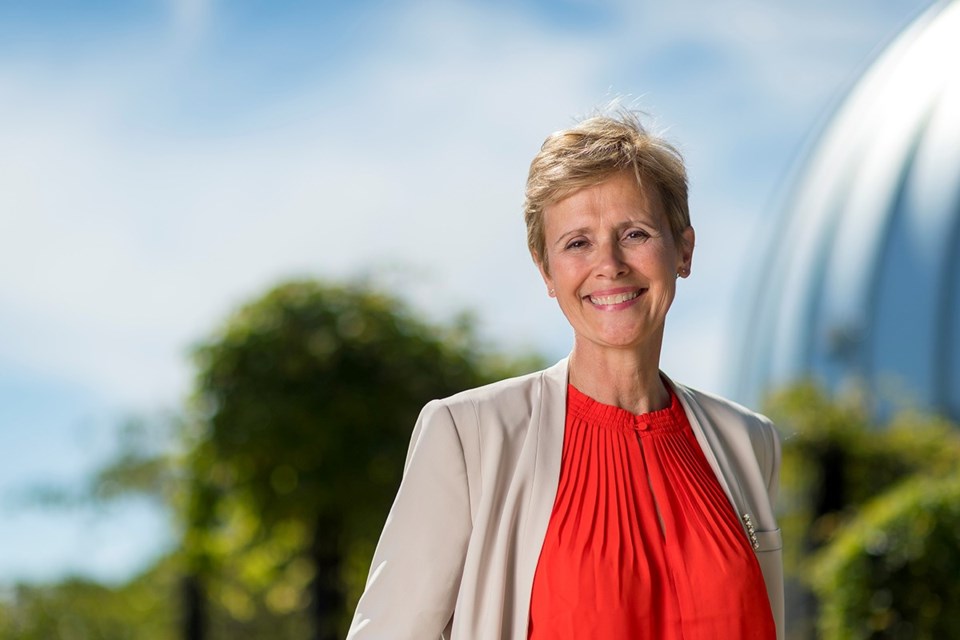A former nurse who started practicing at the beginning of the AIDS crisis in the 1980s before pivoting to a formidable academic career has been named Simon Fraser University’s new president.
Joy Johnson, currently the university’s vice-president research and international, will take the helm in September, is replacing Andrew Petter, who has held the position for 10 years.
She will be SFU’s second female president. (Pauline Jewett – the first woman president of any co-ed university in Canada – served in the role from 1974 to 1978.)
'That really stays with you'
Johnson came to SFU just over five years ago after serving as the scientific director for the Institute of Gender and Health at the Canadian Institutes of Health Research (CIHR) since January of 2008.
Before that she was a UBC nursing professor and researcher – and before that she was a nurse at St. Paul’s Hospital in Vancouver for almost five years.
“We were seeing these really sick people coming into hospital, and at that point there were a lot of questions about what AIDS was,” she said of her time working as a nurse. “That pushed me to really appreciate the importance of science and research. We also saw advocates around the AIDS epidemic demanding research, demanding that we learn more, but I also witnessed nurses that I worked with being really frightened themselves and refusing to care for patients because they were so frightened, and that really stays with you.”
Johnson said her time at St. Paul’s shaped who she is today.
“I have a lot of compassion for people who are experiencing adversity, but I also have a certain problem-solving orientation because, as a nurse, you’ve gotta get stuff done,” she said.
Administration = strategy
After about five years as a practicing RN, she went back to get her masters and then PhD in nursing.
Since then, she has accumulated an impressive “depth of academic and research experience,” according to SFU board of governors chair Fiona Robin, who chaired the presidential search committee.
Johnson has co-authored more than 180 peer-reviewed manuscripts, according to a press release on her appointment.
Last year, she was named a Fellow of the Royal Society of Canada, the country's highest academic honour, for her research in sex and gender in health, in particular, substance use and mental health as well as for shaping Canada’s health research landscape to better represent women.
She first made the jump from teaching and research to administration when she got on with the CIHR, the national funding body for health research in Canada.
“Often what comes to mind when people think of administration is meetings and bureaucracy and that kind of stuff, but what it is for me is people and strategy; it’s figuring out how to get stuff done,” she said. “A lot of the skills one uses as a researcher, one uses as an administrator – that kind of assessment, planning, action, study, looking at outcomes, holding themselves accountable.”
Challenges and goals
When asked what she sees as the biggest challenges facing the university, Johnson said SFU is a growing “university of possibilities,” and one of the challenges is deciding what areas the university wants to focus on and then figuring out how to deliver on those areas.
She acknowledged money is another challenge.
“I don’t think anyone is going to say that budgets are not a challenge for universities these days,” she said. “We continue to try to be as fiscally responsible as we possibly can, to think about how to make sure that we’re providing excellent services to our students and growing those services for our students.”
Another challenge, one that Johnson said is personally important to her, is equity diversity and inclusion.
Universities are big institutions, she said, and the vision for them is a shared vision, not a president’s vision, but there are three personal priorities she said she’d like to deliver on during her tenure: making the university more equitable, diverse and inclusive; fulfilling the commitments SFU made to Indigenous reconciliation in October 2017; and providing the best student experience possible.
“Sure they want a degree, but most of them also want to make a difference in this world, so we need to continue to figure out how to harness that enthusiasm and power of students,” she said.



